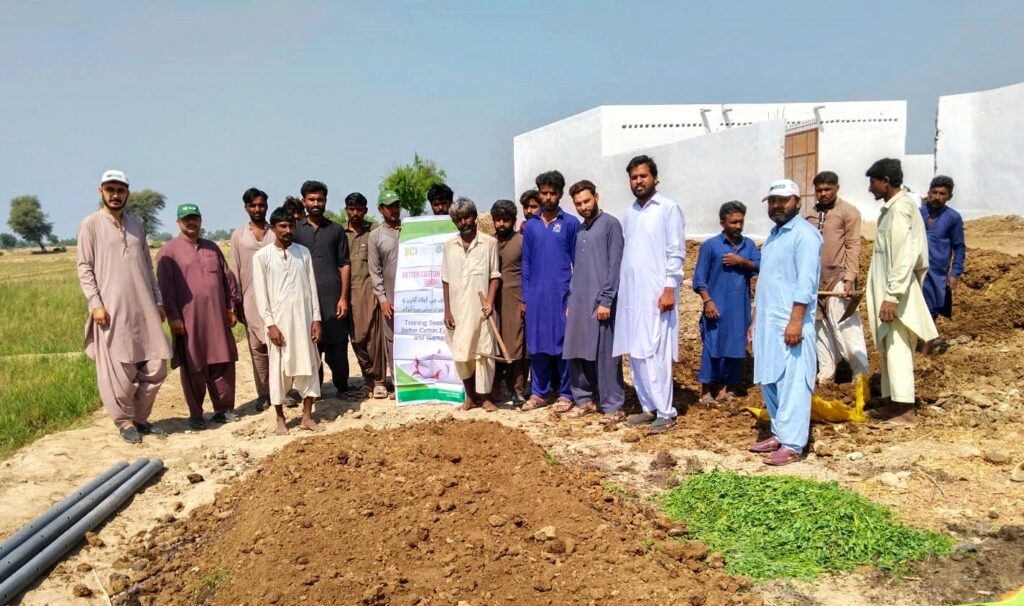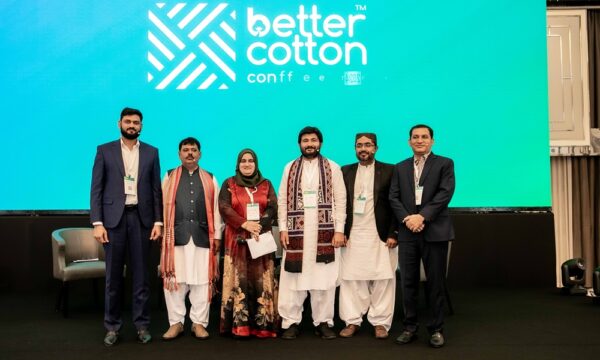
The devastation brought about by the monsoon floods in Pakistan left millions displaced and without food, clean drinking water, and shelter.
After major destruction in several areas of Balochistan and Khyber Pakhtunkhwa, the floods inundated major districts of the Sindh province where more than 14 million people alone have been affected by the disaster. Sadly over 500 lost their lives.
Several villages in district Sanghar have been fully submerged and thousands of adobe houses have been destroyed. For miles, the only thing that has been visible is water and tree tops.
Area surveyed
Staff from CABI’s centre in Pakistan surveyed the area under which it is working with farmers as part of the Better Cotton Initiative (BCI) project ‘Producing better cotton in Pakistan’ that is funded by the Better Cotton Growth & Innovation Fund (BC GIF).
This including assessing the district Sanghar. During the survey, it was observed that most farming communities lost their crops and houses and their livestock was starving to death.
Smallholder farmers are particularly vulnerable to natural disasters. Not only were their summer crops ruined, but they are now struggling to buy seeds, fertiliser and other inputs for their winter crops. This is because prices of all have skyrocketed.
To achieve the goal of producing sustainable cotton, BCI introduced a Better Cotton Standard System (BCSS). This defines the practice-based Principles and Criteria (P&C) to help framers produce cotton in a way that meets BCI social and environmental sustainability standards without sacrificing their crop production.
Fertilizer preparation training
Allah Ditto Jatt is one of the BCI farmers who received training on compost fertilizer preparation. The training was aimed at reducing the dependency of BCI farmers on chemical fertilizer due to an increase in pest attacks on their crops which can threaten productivity and resulting profits.

Allah Ditto Jatt said, “I am very pleased to save PKR 8000 on my one acre of cotton crop. I have observed significant transformation in water holding capacity of my soil as compared to other acres of cotton crops. I would like to acknowledge CABI’s efforts in enhancing the capacities of the farming communities in our district without any greed.”
Allah Ditto Jatt hails from the village Qadir Jatt tehsil, Khipro district Sanghar, and is registered as a BCI farmer since April 2022. Previously, he was implementing traditional practices on his farm to grow cotton.
This included using chemical fertilizers on his cotton crops. This costed him almost PKR 16000 per acre – which was way too costly. At that time he was unaware of the modern techniques that can used to protect crops and grow cotton in a more sustainable and profitable manner.
Participatory demonstration
However, a lack of proper knowledge on the process of preparation of compost and its application techniques was hindering the farmers in expansion of its use. Keeping in view the needs and interests of the farmers, a total of 43 farmers from various villages of district Sanghar were trained by field facilitators. This included a participatory demonstration on the compost preparation process.
The training focused on aerated composting and explained the significance of avoiding pest scouting techniques while applying pesticides.
The farmers were advised to cover the compost pits to reduce the loss of moisture and the nutrients at the same time protect from rain to maintain the moisture content in the compost. This is because excess water could result in the decay of the compost.
During the training, the facilitator showed the process on demonstration plots of compost at farm to highlight the impacts of good agricultural practices. It involved observation and a participatory demonstration on the preparation of compost.
This activity intended to provide the participants an exposure to the activities involved in composting and, therefore, upgrade their capacity through self-help for replicating the process independently.
Aerobic composting method
The aerobic composting method was used to develop sufficient compost for one acre of land by using the following ingredients: 1000 Kgs of poultry manure, 1000 kg of farmyard manure, 40 kg of green manure, 200 kg of banana waste, and 5 kg of urea.
The compost was ready to use in 45 days. During compost development, other local farmers were also present at the plot to learn this applied technique. After compost was applied, farmers witnessed a reduction of two bags of nitrogen fertilizers on cotton crops – much to their surprise.
Allah Ditto Jatt said, “Upon the development of compost, I applied the ready product to my cotton farm, where I witnessed the shocking result in growth of my crops and enhanced water-holding capacity of my soil.”
Upon seeing the tremendous results, dozens of other farmers developed and applied compost at their farms and are enjoying its benefits. BCI farmers are increasingly getting attracted towards compost fertilizers and practice of making compost at household level had already been started their own production initiatives.
Additional information
Main image: Better Cotton Initiative (BCI) farmers learn the benefits of compost technology during a demonstration plot activity facilitated by CABI (Credit: CABI).
Project page
Find out more about how CABI is helping to produce better cotton in Pakistan from the project page here.
Other relevant stories
‘Using compost to grow better cotton in Pakistan: a farmer’s story.’
Authors
Partab Rai
Noor Nabi Bhutto – Project Manager
Contributor
Mahwish Sarwar– Communication Officer
1 Comment
Leave a Reply
Related News & Blogs
Empowering farmers through digitalisation: Strengthening the future of the cotton industry
When it comes to farmer advisory, are we really able to advise? That was the question posed to Katherine Cameron, CABI’s Head of Digital Advisory Tools, at the Better Cotton Conference 2025 which took place recently in Izmir, Turkey. The responsibility…
24 June 2025





wow thats really great article because minimum use of fertilizer is very good for health. future is all about organic farming and its necessary for good health.